Adolf Anderssen
Karl Ernst Adolf Anderssen (July 6, 1818 – March 13, 1879)[1] was a German chess master. He won the great international tournaments of 1851 and 1862, but lost matches to Paul Morphy in 1858, and to Wilhelm Steinitz in 1866. Accordingly, he is generally regarded as having been the world's leading chess player from 1851 to 1858, and leading active player from 1862 to 1866, although the title of World Chess Champion did not yet exist.
| Adolf Anderssen | |
|---|---|
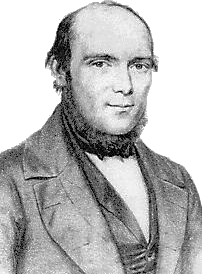 | |
| Full name | Karl Ernst Adolf Anderssen |
| Country | Kingdom of Prussia |
| Born | July 6, 1818 Breslau, Prussia (now Wrocław, Poland) |
| Died | March 13, 1879 (aged 60) |
Anderssen became the most successful tournament player in Europe, winning over half the events he entered, including the very strong Baden-Baden 1870 chess tournament. He achieved most of these successes when he was over the age of 50.
Anderssen is famous today for his brilliant sacrificial attacking play, particularly in the "Immortal Game" (1851) and the "Evergreen Game" (1852). He was an important figure in the development of chess problems, driving forward the transition from the "Old School" of problem composition to the elegance and complexity of modern compositions. He was also one of the most likeable of chess masters and became an "elder statesman" of the game, to whom others turned for advice or arbitration.
Background and early life
Anderssen was born in Breslau (now called Wrocław, Poland), in the Prussian Province of Silesia, in 1818. He lived there for most of his life, sharing a house with and supporting his widowed mother and his unmarried sister. Anderssen never married. He graduated from the public gymnasium (high school) in Breslau and then attended university, where he studied mathematics and philosophy. After graduating in 1847 at the age of 29, he took a position at the Friedrichs-Gymnasium as an instructor and later as Professor of Mathematics. Anderssen lived a quiet, stable, responsible, respectable middle-class life. His career was teaching mathematics, while his hobby and passion was playing chess.[2]
When Anderssen was nine years old, his father taught him how to play chess.[3] Anderssen said that as a boy, he learned the strategy of the game from a copy of William Lewis' book Fifty Games between Labourdonnais and McDonnell (1835).[4]
Chess career
First steps
Anderssen first came to the attention of the chess world when he published Aufgabe für Schachspieler ("Task for chess players"), a collection of 60 chess problems, in 1842.[2][3] He continued to publish problems for many years, both in magazines and as a second collection in 1852.[5][6] These brought him to the attention of the "Berlin Pleiades" group, which included some of the strongest players of the time, and he played matches against some of them.[7] Anderssen's development as a player was relatively slow, largely because he could spare neither the time nor the money to play many matches against strong players. Nevertheless, by 1846 he was able to put up a good fight against another Pleiades member, Tassilo von Heydebrand und der Lasa, who may have been the world's strongest player at the time.[8] In 1846, he became the editor of the magazine Schachzeitung der Berliner Schachgesellschaft (later called Deutsche Schachzeitung) when its founder Ludwig Bledow, one of the "Berlin Pleiades", died. Anderssen held this post until 1865.[9]
London 1851
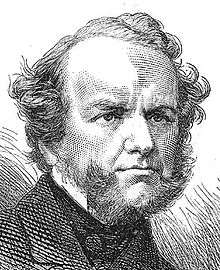
In 1848 Anderssen drew a match with the professional player Daniel Harrwitz.[10] On the basis of this match and his general chess reputation, he was invited to represent German chess at the first international chess tournament, to be held in London in 1851. Anderssen was reluctant to accept the invitation, as he was deterred by the travel costs. However the tournament's principal organizer, Howard Staunton, offered to pay Anderssen's travel expenses out of his own pocket if necessary, should Anderssen fail to win a tournament prize. Anderssen accepted this generous offer.[4]
Anderssen's preparations for the 1851 London International Tournament produced a surge in his playing strength: he played over 100 games in early 1851 against strong opponents including Carl Mayet, Ernst Falkbeer, Max Lange and Jean Dufresne.[8] The 1851 International Tournament was a knock-out event in which pairs of competitors played short matches, and Anderssen won it by beating Lionel Kieseritzky, József Szén, Staunton, and Marmaduke Wyvill – by margins of at least two games in every case.[11] His prize was two-thirds of the total prize fund of £500, i.e. about £335;[12] that is equivalent to about £240,000 ($370,200) in 2006's money.[13] When Anderssen and Szén found they were to play each other, they agreed that, if either won the tournament, the other would receive one-third of the prize; this does not appear to have been considered in any way unethical.[12]
Although most chess books regard Wilhelm Steinitz as the first true world champion,[3] one of the organizers of the 1851 London International Tournament had said the contest was for "the baton of the World’s Chess Champion".[14] In fact Anderssen was not described as "the world champion", but the tournament established Anderssen as the world's leading chess player, at the time it had same meaning.[3] The London Chess Club, which had fallen out with Staunton and his colleagues, organized a tournament that was played a month later and included several players who had competed in the International Tournament. The result was the same – Anderssen won.[15]
Morphy match, 1858
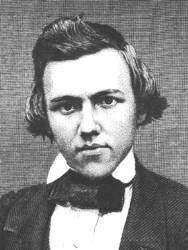
Opportunities for tournament play remained rare, and Anderssen was reluctant to travel far because of the expense. In his one recorded tournament between 1851 and 1862, a one-game-per-round knock-out tournament at Manchester in 1857, he was eliminated in the second round.[15] Then in late 1858 he was beaten 8–3 by the American champion Paul Morphy in a famous match held in Paris, France (two wins, two draws, seven losses).[16] Although Anderssen knew as well as anyone how to attack, Morphy understood much better when to attack and how to prepare an attack. Morphy had recently scored equally convincing wins in matches against other top-class players: Johann Löwenthal, the Rev. John Owen and Daniel Harrwitz.[17] Morphy returned to the United States in 1859 and soon afterwards announced his retirement from serious chess, however, making Anderssen once again the strongest active player.[18]
Anderssen played the curious opening move 1.a3 in three games of his match against Morphy, and broke even with it (one loss, one draw, one win).[19] This opening move, now referred to as "Anderssen's Opening", has never been popular in serious competition.[20]
Other games 1851–1862
Shortly after the 1851 London International Tournament, Anderssen played his two most famous games, both casual encounters which he won by combinations that involved several sacrifices. In the first, as White against Lionel Kieseritzky in London just after the International Tournament (1851) and now called the "Immortal Game", he sacrificed a bishop, both rooks and finally his queen.[21] In the second, played in Berlin in 1852 as White against Jean Dufresne and now called the "Evergreen Game", the total sacrifice was more modest, but still exceeded a queen and a minor piece.[22]
After the match with Morphy, Anderssen played two matches against Ignác Kolisch, one of the leading players of the time, who later became a wealthy banker and patron of chess.[23][24] Anderssen drew their match in 1860 and narrowly won in 1861 (5/9; won four, drew two, lost three; Kolisch was ahead at the half-way stage).[25]
London 1862
Anderssen won the London 1862 chess tournament, the first international round-robin tournament (in which each participant plays a game against each of the others) with a score of twelve wins out of thirteen games. He lost only one game, to the Rev. John Owen[26] and finished two points ahead of Louis Paulsen, who had the best playing record in the early 1860s.[27][28] Morphy had retired from chess at this time, so Anderssen was again generally regarded as the world's leading active player.[18]
Shortly after the tournament, he played a match against tournament runner-up Paulsen, ending in a draw (3 wins, 3 losses, 2 draws).[29] In 1864, he drew another match (3 wins, 3 losses, and 2 draws) against Berthold Suhle,[25] who was a strong player and respected chess writer.[30]
Steinitz match, 1866
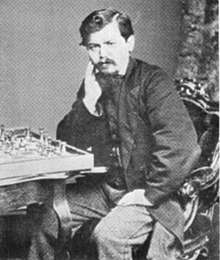
In 1866 Anderssen lost a close match with 30-year-old Wilhelm Steinitz (six wins, eight losses, and no draws; Steinitz won the last two games).[31] Although Steinitz is now known for inventing the positional approach to chess and demonstrating its superiority, the 1866 match was played in the attack-at-all-costs style of the 1850s and 1860s.[32] This is generally seen as the point at which Steinitz succeeded Anderssen as the world's leading active player. Although ideas of a contest for the world championship had been floating around since the 1840s,[14] the 1866 Anderssen–Steinitz match was not defined as being for the world championship, and many were opposed to the claim of such a title while Morphy was retired from chess and still alive. Furthermore, Anderssen remained dominant both in top tournaments and in personal matches against Zukertort until 1871.[33]
1866–1879
By this time tournaments were becoming more frequent, and the round-robin format was adopted. At the same time, Anderssen, after losing the match to Morphy in 1858 and to Steinitz in 1866, re-dedicated himself to chess, particularly studying both endgames and positional play. The result was that Anderssen, in his early fifties, was playing the finest chess of his career. As a result, Anderssen compiled a very successful tournament record in the late stages of his career: five first places, two second places, two third places; and a sixth place in the final year of his life, when his health was failing.[15][34] One of his first places was ahead of Steinitz, Gustav Neumann, Joseph Henry Blackburne, Louis Paulsen and several other very strong players at the Baden-Baden 1870 chess tournament. In terms of the number of leading players present, this could be regarded as one of the top 20 tournaments ever.[35][36] One of Anderssen's third places was at the strong Vienna 1873 tournament, when he was 55. About half of Anderssen's tournament successes came at championships of the different regional German Chess Federations; but these were open to all nationalities, and most of them had a few "top ten" or even "top five" competitors.[15] Anderssen usually beat Zukertort in matches, but his dominance came to an end in 1871.
The Leipzig 1877 tournament was organized in his honour and named the "Anderssen-Feier" (Anderssen Celebration);[37] Anderssen finished second in the tournament behind Louis Paulsen.
Still at Leipzig, Anderssen lost a match against tournament winner Louis Paulsen (three wins, one draw, and five losses). Matches were Anderssen's relative weakness; his only match win in this period was in 1868, against the 26-year-old Johann Zukertort (eight wins, one draw, and three losses).[31]
Assessment
Playing strength and style
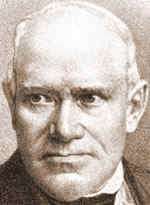
Anderssen was very successful in European tournaments from 1851 to early 1878, taking first prize in over half of the events in which he played.[15] His only recorded tournament failures were a one-game-per-round knock-out event in 1857 and sixth place at Paris 1878 when his health was failing and he had only about a year to live.[15][34] His match record was much weaker: out of the 12 that he played, he won only two, drew four and lost six. Though outclassed by Morphy, and to a lesser extent by Steinitz, Anderssen has been called the first modern chess master.[38]
Arpad Elo, inventor of the Elo rating system, retroactively calculated ratings through history, and estimated that Anderssen was the first player with a rating over 2600.[39] Chessmetrics ranks Anderson as one of the top two players for most of the period from 1859 to 1873, and as the strongest player in the world seven months distributed between 1860 and 1870.[40]
Steinitz rated Anderssen as one of the two greatest attacking players of his time: "We all may learn from Morphy and Anderssen how to conduct a king’s-side attack, and perhaps I myself may not have learnt enough."[41] Although Anderssen is regarded as a member of the "heroic" attacking school,[7] he was not in favor of mindless aggression, for example he said: "Move that one of your pieces, which is in the worst plight, unless you can satisfy yourself that you can derive immediate advantage by an attack",[42] a principle more recently labelled "Makogonov's rule".[43] According to Fine, his approach to development was haphazard and he totally failed to understand why Morphy won.[3]
Anderssen's home town was so proud of him that in 1865 Breslau University awarded him an honorary doctorate.[3]
Influence on chess
Due to the perceived beauty of its attacking style, some of Anderssen's games, such as the Immortal Game and the Evergreen Game, are among the most famous in chess history.
The "heroic" attacking school of play to which Anderssen belonged was eclipsed by Steinitz' positional approach – by 1894 it was generally acknowledged that the only way to beat Steinitz was to apply Steinitz' principles.[44]
Anderssen has had a more enduring influence on chess problem composition. He started composing in the last years of the "Old School", whose compositions were fairly similar to realistic over-the-board positions and featured spectacular "key" moves, multiple sacrifices and few variations.[6] He was one of the most skillful composers of his time, and his work forms an early stage of the "Transition Period", between the mid-1840s and the early 1860s, when many of the basic problem ideas were discovered, the requirement for game-like positions was abandoned and the introduction of composing competitions (the first of which was in 1854) forced judges to decide on what features were the most desirable in a problem.[5]
Outside the field of chess problems Anderssen was not a prolific author. However he edited the magazine Schachzeitung der Berliner Schachgesellschaft (later called Deutsche Schachzeitung) from 1846 to 1865, and was co-editor with Gustav Neumann of Neue Berliner Schachzeitung from 1864 to 1867.[9]
Personality
Adolf Anderssen, 1858[45]
Steinitz wrote: "Anderssen was honest and honourable to the core. Without fear or favour he straightforwardly gave his opinion, and his sincere disinterestedness became so patent....that his word alone was usually sufficient to quell disputes...for he had often given his decision in favour of a rival..."[4] On the other hand, Reuben Fine, a 20th-century player, wrote, "There is a curious contrast between his over-the-board brilliance and his uninspired safety-first attitude in everyday affairs."[3]
Death
Anderssen died on March 13, 1879, in his hometown. The Deutsche Schachzeitung noted his death in 1879 with a nineteen-page obituary. His cause of death was a heart attack.[2] Bombing raids during World War II damaged his grave in Breslau. After the war, the city became part of Poland and is now known under its Polish name Wrocław. In 1957, the Polish Chess Federation decided to re-bury Anderssen in a new grave at the Osobowicki Cemetery.[46][47]
Tournament results
Sources:[2][11][15][27][34][48][49]
| Date | Location | Place | Score | Notes |
|---|---|---|---|---|
| 1851 | London International Tournament | 1 | 15/21 | Ahead of Marmaduke Wyvill, Elijah Williams, Howard Staunton, József Szén, Hugh Alexander Kennedy, Bernhard Horwitz, Henry Edward Bird, Lionel Kieseritzky, Carl Mayet, Johann Löwenthal, Edward Löwe, Alfred Brodie, James Mucklow, Samuel Newham, and E.S. Kennedy. A knock-out tournament in which the contestants played mini-matches in each round, increasing from best-of-3 in the 1st round to best-of 8 in the final. Anderssen himself beat Kieseritzky, Szen, Staunton and Wyvill – his closest mini-match was +4−2=1 in the final against Wyvill.[11] |
| 1851 | London Chess Club Tournament | 1 | 7½/8 | Ahead of Karl Meyerhofer, Daniel Harrwitz, Frederic Deacon, Kieseritzky, Horwitz, Szabo, Löwe, and Ehrmann. Apparently intended to be round-robin, but the weaker players quickly dropped out. |
| 1857 | Manchester (British Chess Association) | 3/4 | 1/2 | 8-player knock-out tournament in which the contestants played just 1 game in each round. Anderssen beat Harrwitz in the 1st round, and lost to Löwenthal in the 2nd round. Löwenthal drew the final against Samuel Boden, then Boden retired. |
| 1862 | London International Tournament | 1 | 12/13 | Ahead of Louis Paulsen, (11/13), Rev. Owen (10/13), George Alcock MacDonnell, Serafino Dubois, Wilhelm Steinitz and 8 others.[27] One of the first successful round-robin tournaments. |
| 1868 | Aachen (West German Chess Federation) | 1= | 3/4 then 0/1 | Anderssen and Max Lange tied for 1st; the order after the playoff was (1) Lange, (2) Anderssen; all finished ahead of Wilfried Paulsen, Johannes Zukertort, and Emil Schallopp. |
| 1869 | Hamburg (North German Chess Federation) | 1= | 4/5 then 1½/2 | Anderssen and Louis Paulsen tied for 1st; the order after the playoff was (1) Anderssen, (2) Paulsen; all finished ahead of Zukertort, Johannes von Minckwitz, Schallopp, and Alexander Alexander. |
| 1869 | Barmen (West German Chess Federation) | 1 | 5/5 | Ahead of Zukertort, von Minckwitz, Schallopp and Wilfried Paulsen and Richard Hein. |
| 1870 | Baden-Baden International Tournament | 1 | 11/18 | Ahead of Steinitz, Gustav Neumann, Joseph Henry Blackburne, Louis Paulsen, Cecil Valentine De Vere, Szymon Winawer, Samuel Rosenthal, von Minckwitz and Adolf Stern. |
| 1871 | Krefeld (West German Chess Federation) | 1= | 4/5 then 1/2 | Anderssen, von Minckwitz, and Louis Paulsen tied for 1st; the order after the playoff was (1) Paulsen, (2) Anderssen, (3) Minckwitz; all finished ahead of Karl Pitschel, Carl Göring, and Wilfried Paulsen. |
| 1871 | Leipzig (Central German Chess Federation) | 1= | 4½/5 then 1/1 | Anderssen and Samuel Mieses tied for 1st; then Anderssen won a playoff game. |
| 1872 | Altona (North German Chess Federation) | 1 | 3½/4 | Ahead of Neumann, Göring, Schallopp and Pitschel. |
| 1873 | Vienna International Tournament | 3 | 8½/11: 19/30 | Behind Steinitz (10/11: 22½/25) and Blackburne; ahead of Rosenthal (7½/11: 17/28), Louis Paulsen, Henry Edward Bird, Max Fleissig, Josef Heral, Philipp Meitner, Oscar Gelbfuhs, Adolf Schwarz and Pitschel. This tournament had a very unusual scoring system: each player played a 3-game mini-match with each of the others and scored 1 for a won mini-match and ½ for a drawn mini-match. The numbers before the colons (:) are the points awarded; the other 2 numbers are the usual "games won / games played" scoring. |
| 1876 | Leipzig (Central German Chess Federation) | 1= | 3½/5 then 2/2 | Anderssen, Goering and Pitschel tied for 1st; the order after the playoff was (1) Anderssen, (2=) Goering and Pitschel; all finished ahead of Louis Paulsen, Schallopp and Carl Berber. |
| 1877 | Leipzig (Central German Chess Federation) | 2= | 8½/11 | Behind Louis Paulsen (9/11); tied with Zukertort (8½/11); ahead of Winawer (7½/11), Goering, Berthold Englisch, Schallopp and 5 others. This tournament was specially arranged to honour the 50th anniversary of Anderssen's learning the chess moves. |
| 1878 | Frankfurt (West German Chess Federation) | 3 | 6/9 | Behind Louis Paulsen (8/9) and Adolf Schwarz (6½/9); ahead of von Minckwitz (5/9), Wilfried Paulsen (4½/9) and 5 others. |
| 1878 | Paris International Tournament | 6 | 12½/22 | Anderssen was in poor health.[34] The event was won by Winawer and Zukertort. |
Match results
Sources:[2][7][10][25][48][49][31][50][51]
| Date | Opponent | Result | Location | Score | Notes | |
|---|---|---|---|---|---|---|
| 1845 | Ludwig Bledow | Lost | Breslau | ½/5 | +0=1–4 | Sources vary about the score.[7] |
| 1845–1846 | Tassilo von der Lasa | Lost | Breslau | 2/6 | +2=0–4 | |
| 1848 | Daniel Harrwitz | Drew | Breslau | 5/10 | +5=0–5 | |
| 1851 | Tassilo von der Lasa | Lost | Breslau | 5/15 | +?=?–? | |
| 1851 | Karl Pitschel | Drew | Leipzig | 2/4 | +1=2–1 | |
| 1851 | Jean Dufresne | Won | Berlin | 13/18 | +12=2–4 | |
| 1851 | Ernst Falkbeer | Won | Berlin | 4/5 | +4=0–1 | |
| 1851 | Carl Mayet | Won | Berlin | 4/4 | +4=0–0 | |
| 1851 | Eduard Jenay | Won | London | 4½/8 | +?=?–? | Casual games |
| 1851 | Lionel Kieseritzky | Lost | London | 6/16 | +5=2–9 | Casual games |
| 1851 | Johann Löwenthal | Won | London | 5½/8 | +5=1–2 | Casual games; sources give also separate results: +5–1, +5–2, and +5–4 for Anderssen, and +4=1–3 for Löwenthal [52] |
| 1858 | Daniel Harrwitz | Won | Paris | 4/6 | +3=2–1 | Sources give also separate results: +3=3–1 and +2=2–1 [53] |
| 1858 | Paul Morphy | Lost | Paris | 3/11 | +2=2–7 | |
| 1858 | Paul Morphy | Lost | Paris | 1/6 | +1=0–5 | Casual games |
| 1859 | Max Lange | Lost | Breslau | 3½/8 | +3=1–4 | Casual games |
| 1859 | Carl Mayet | Won | Berlin | 7/8 | +7=0–1 | |
| 1859 | Jean Dufresne | Won | Berlin | 4/4 | +4=0–0 | |
| 1859 | Berthold Suhle | Won | Berlin | 31/48 | +27=8–13 | Casual games |
| 1860 | Philipp Hirschfeld | Won | Berlin | 16½/29 | +14=5–10 | |
| 1860 | Ignatz von Kolisch | Drew | Paris | 5½/11 | +5=1–5 | |
| 1860 | Paul Journoud | Won | Paris | 3½/5 | +3=1–1 | |
| 1860 | Jules Arnous de Rivière | Drew | Paris | 2½/5 | +2=1–2 | |
| 1861 | Ignatz von Kolisch | Won | London | 5/9 | +4=2–3 | |
| 1861 | Johann Löwenthal | Won | London | 2/3 | +2=0–1 | Casual games |
| 1862 | Louis Paulsen | Drew | London | 4/8 | +3=2–3 | |
| 1862 | Wilhelm Steinitz | Won | London | 2/3 | +2=0–1 | Casual games |
| 1864 | Berthold Suhle | Drew | Berlin | 4/8 | +3=2–3 | |
| 1865 | Carl Mayet | Won | Berlin | 5½/8 | +5=1–2 | |
| 1866 | Johannes Minckwitz | Won | Berlin | 8½/12 | +8=1–3 | |
| 1866 | Gustav Neumann | Lost | Berlin | 10/24 | +9=2–13 | |
| 1866 | Wilhelm Steinitz | Lost | London | 6/14 | +6=0–8 | |
| 1867 | Samuel Mieses | Won | Breslau | 4½/5 | +4=1–0 | |
| 1868 | Johannes Zukertort | Won | Berlin | 8½/12 | +8=1–3 | |
| 1870 | Louis Paulsen | Lost | Baden-Baden | ½/3 | +0=1–2 | |
| 1871 | Johannes Zukertort | Lost | Berlin | 2/7 | +2=0–5 | |
| 1876 | Louis Paulsen | Lost | Leipzig | 4½/10 | +4=1–5 | |
| 1877 | Louis Paulsen | Lost | Leipzig | 3½/9 | +3=1–5 | |
See also
- List of chess games
- Андерсена мат (Андерсена тема)
References
- "Anderssen, Adolf" in The New Encyclopædia Britannica. Chicago: Encyclopædia Britannica Inc., 15th edn., 1992, Vol. 1, p. 385.
- "Adolf Anderssen (1818–1879)". Archived from the original on 2009-10-26. Retrieved 2008-06-17.
- Fine, R. (1976). The World's Great Chess Games. Dover. p. 14-17.
- "Morphy's opponents: Adolf Anderssen". Archived from the original on 11 May 2008. Retrieved 2008-06-17.
- Weenink, H.G.M. (1926). Hume, G.; White, A.C. (eds.). The Chess Problem.
- Howard, K.S. (1970). Classic Chess Problems by Pioneer Composers. Courier Dover. ISBN 0-486-22522-4. Retrieved 2008-06-17.
- Spinrad, J.P. "Ludwig Erdmann Bledow" (PDF). chesscafe.com. Archived (PDF) from the original on 25 June 2008. Retrieved 2008-06-17.
- Diggle,G.H. "The Baron" (PDF). chesscafe.com. Archived (PDF) from the original on 26 June 2008. Retrieved 2008-06-17.
- "Chess Periodicals". Archived from the original on September 26, 2007. Retrieved 2008-06-17.
- "I grandi matches fino al 1849". Retrieved 2008-06-17.
- "1851 London Tournament". Archived from the original on 17 June 2008. Retrieved 2008-06-17.
- Staunton, H. The Chess Tournament. Hardinge Simpole. ISBN 1-84382-089-7. can be viewed online at or downloaded as PDF from Internet Archive
- Conversion based on average incomes, which are the most appropriate measure for several days' hard work. If we use average prices for the conversion, the result is about £27,000. "Five Ways to Compute the Relative Value of a U.K. Pound Amount, 1830–2006: 2006 equivalent of £335 in 1851". Archived from the original on 2009-04-29. Retrieved 2008-06-17.
- Spinrad, J.P. (2006). "Early World Rankings" (PDF). chesscafe.com. Archived (PDF) from the original on 25 June 2008. Retrieved 2008-06-17.
- "I tornei di scacchi fino al 1879". Retrieved 2008-06-17.
- "Morphy Matches". Retrieved 2008-06-17. from Mark Weeks' Chess Pages
- Fine, R. (1976). The World's Great Chess Games. Dover. p. 21.
- Draper, N.R. (1963). "Does Age Affect Master Chess?". Journal of the Royal Statistical Society, Series A. 126 (1): 120–127. doi:10.2307/2982450. JSTOR 2982450.
- "Anderssen vs Morphy, Paris 1858, game 6". Retrieved 2008-06-17. "Anderssen vs Morphy, Paris 1858, game 8". Retrieved 2008-06-17. "Anderssen vs Morphy, Paris 1858, game 10". Archived from the original on 12 July 2008. Retrieved 2008-06-17.
- Eric Schiller (2002). Unorthodox Chess Openings (Second ed.). Cardoza. ISBN 1-58042-072-9.
- "Adolf Anderssen vs Lionel Kieseritzky, 1851, King's Gambit Accepted – The "Immortal Game"". Archived from the original on 7 June 2008. Retrieved 2008-06-17.
- "Adolf Anderssen vs Jean Dufresne, Berlin 1852, Evans Gambit – The "Evergreen Game"". Archived from the original on 14 July 2008. Retrieved 2008-06-17.
- "Chessmetrics Player Profile: Ignatz Kolisch". Retrieved 2008-06-17.
- Singer, Isidore; Porter, A. (1901–1906). "Kolisch, Baron Ignaz Von". Jewish Encyclopedia. 7. p. 547.
- "I grandi matches 1850 - 1864". Archived from the original on 16 May 2008. Retrieved 2008-06-17.
- A very strong player who had a long career; 1862 was his most successful year: "Chessmetrics Player Profile: John Owen". Retrieved 2008-06-17.
- "1862 London Tournament". Archived from the original on 17 June 2008. Retrieved 2008-06-17.
- "Chessmetrics Player Profile: Louis Paulsen". Retrieved 2008-06-17.
- World Chess Championship : 1862 Anderssen vs. Paulsen
- In collaboration with Gustav Neumann, see the "Lehrbücher" ("textbooks") section of "Schachliteratur 1844–1945". Archived from the original on 2008-01-21. Retrieved 2008-06-17. Wilhelm Steinitz respected their work, see his review of Wormald’s "The Chess Openings" quoted at Winter, E. "Chess Notes Archive 15". Archived from the original on 9 May 2008. Retrieved 2008-06-17.
- "I matches 1865/79". Retrieved 2008-06-17.
- Silman, J. "Wilhelm Steinitz". Jeremy Silman. Archived from the original on 19 June 2008. Retrieved 2008-06-17. Has several examples of Steinitz testing his theories in top-class play.
- Raymond Keene and David Goodman (1986). The Centenary Match, Kasparov–Karpov III. pp. 1–2.
- "World Exhibitions". Archived from the original on 19 June 2008. Retrieved 2008-06-17.
- "The Strongest Tournaments in Chess History". Archived from the original on May 2, 2007. Retrieved 2008-06-17.
- "Formulas". Retrieved 2008-06-17.
- "Anderssen-Feier", Deutsche Schachzeitung, 1877
- "The World's Great Chess Games", Reuben Fine, McKay 1976, p.17
- Elo, Arpad (1978). The Rating of Chessplayers, Past and Present. Arco. p. 191. ISBN 0-668-04721-6.
- "Chessmetrics Player Profile: Adolf Anderssen". Retrieved 2008-06-17.
- Winter, E. "Steinitz Quotes". Archived from the original on 9 May 2008. Retrieved 2008-06-17.
- Emanuel Lasker. Manual of Chess. Archived from the original on 24 May 2008. Retrieved 2008-06-17.
- "The secret weapons of the champions". Archived from the original on 2008-08-28. Retrieved 2008-06-17.
- "Ready for a big chess match" (PDF). New York Times. 11 March 1894. Retrieved 2008-06-17.
- Howard Staunton (1871). Chess Praxis, a Supplement to the Chess Player's Handbook. G. Bell & Daldy. p. 502. (quoting a contemporary interview with Max Lange)
- "Find A Grave: Adolf Anderssen". Retrieved 2008-12-08.
- For a picture of his grave, see "At the grave of Adolf Anderssen". Ken Whyld Association. Archived from the original on 2012-02-15. Retrieved 2008-11-19. The source for the date of the reburying is SchachReport, no. 9/1995, p.74
- "Major Chess Matches and Tournaments of the 19th century". Archived from the original on July 4, 2009. Retrieved 2008-06-17.
- "Scores of various important chess results from the Romantic era". Archived from the original on 28 May 2008. Retrieved 2008-06-17.
- Jakov Neistadt, Shakhmaty do Steinitza, pp. 126−177, Fizkultura i sport, Moskwa 1961 (Russian edition)
- Taylor Kingston. "Don't Bet the Farm" (PDF). chesscafe.com. Retrieved 2010-06-26.
- "Archived copy". Archived from the original on 2011-09-18. Retrieved 2010-06-26.CS1 maint: archived copy as title (link)
- http://www.edochess.ca/matches/m402.html
Further reading
- Hooper, David; Whyld, Kenneth (1992). The Oxford Companion to Chess (2nd ed.). Oxford University Press. ISBN 0-19-280049-3.
- World Chess Champions by Edward G. Winter, editor. 1981 ISBN 0-08-024094-1
- The World's Great Chess Games by Reuben Fine; Dover; 1983. ISBN 0-486-24512-8
- Gottschall, Hermann von (2006) [reprint of 1912 edition]. Adolf Anderssen, der Altmeister deutscher Schachspielkunst. Elibron Classics. ISBN 0-543-77333-7. classical standard biography on Anderssen (only in German)
- Kasparov, Garry (2003). My Great Predecessors, part I. Everyman Chess. ISBN 1-85744-330-6. Some material on Anderssen in the first chapter.
External links
- Adolf Anderssen player profile and games at Chessgames.com
- Anderssen Memorial Tournament
- Anderssen's matches (Archived 2009-10-24)
